#travel narratives
Explore tagged Tumblr posts
Text
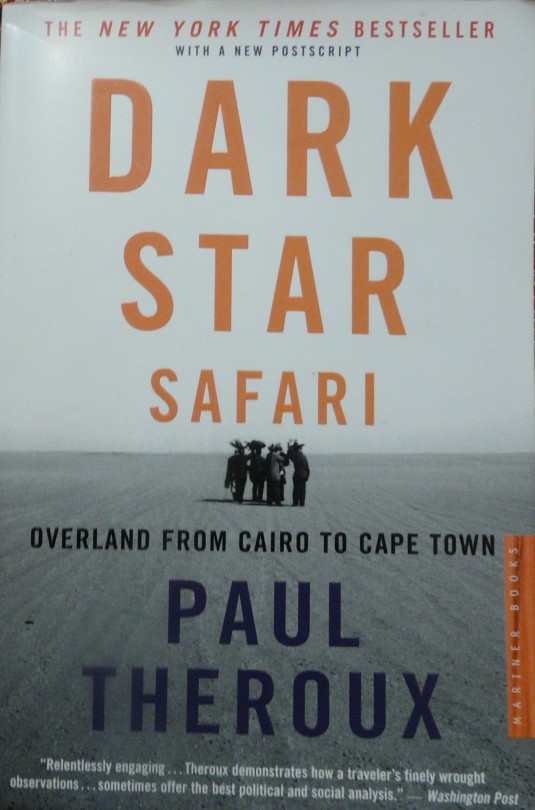
Book Review
Dark Star Safari: Overland from Cairo to Cape Town
by Paul Theroux
Two decades ago, the novelist and travel writer Paul Theroux took an overland trip through Africa, starting in Cairo, Egypt and ending in Cape Town, South Africa. This certainly isn’t the safest or the most comfortable means of experiencing the supposed “dark continent”, but it makes for some interesting experiences and insights. Keeping in mind that Theroux’s observations are just one point of view among many, his resulting book Dark Star provides a unique look at a region of the world that holds a permanent place off the beaten path.
While Dark Star is an easy book to read, breaking it down into its individual elements is a good way to approach its merits and examine its flaws. The first element of importance is Theroux’s sense of place. Wherever he goes, the author describes what he sees and the vibe he gets from his surroundings. Starting on the tourist trail in Egypt, he heads south through Sudan, Ethiopia, Kenya, Tanzania, Uganda, Malawi, Zimbabwe, Mozambique, Zambia, and South Africa. You quickly get a sense of what he appreciates and what he doesn’t. He doesn’t like sites that are swarmed with tourists, nor does he like cities with their concentrations of crime and poverty. He also doesn’t like the “death traps” as he calls public transportation which are usually over-croded minivans driven at dangerous speeds on poorly maintained roads, pockmarked with hippopotamus-sized potholes. If you’ve ever traveled in a Third World country, you will know exaclt what he is talking about.
The places that Theroux does like are usually rural, especially farm lands or jungle villages. These are the places where he sees Africans at their best, meaning Africans being Africans in the absence of corrupt and filthy cities built up on the foundations of European colonialism. Some of the book’s best passages involve descriptions of the pyramids in Sudan which are rarely seen by tourists, a boat trip across Lake Victoria, another boat trip from Malawi across the Zambezi over the border into Zimbabwe, and the pristine countrysides of Zimbabwe and South Africa. All places, whether Theroux likes them or not, are described with language that is clear, simple, and direct, making it easy to visualize what he sees.
Another element that is done to near perfection is writings about the people. Theroux talks with tour guides, people on the streets and in the villages, farmers, nuns, educators, government officials, Indian businessmen, prostitutes, authors, intellectuals, and ordinary people. Just like with the places he goes, he describes these people vividly with precision so that you feel like you quickly get to know them. But not everyone is to his liking. He gets into small argument with a fanatical Rastafarian in Ethiopia, a little ornery with physically fit young men who refuse to work, government officials who demand bribes to do their jobs, and he really gives a hard time to a young American missionary woman about the psychological damage that her evangelical ministry is doing to the local people. There is also plenty of anger directed at clueless tourists as well as NGO and charity workers who he sees as being the Westerners who do the most damage to Africa.
The third element of importance is the author, Paul Theroux himself, and his thoughts and commentaries on everything he sees. Before getting into this subject, it should be mentioned that Theroux had a purpose to his journey. In the 1960s he worked as a Peace Corps volunteer, teaching in Malawi. After getting involved with a Leftist political group, he got fired then accepted a teaching position at a college in Uganda. He wanted to return and see what results, if any, his contributions to Africa grew into. What he found was a major disappointment. The charming campuses and villages where he had lived were in ruins and instead of a thriving civilization, he saw emaciated beggars, starving children, an ignorant populace, and chronically corrupt politicians. Shops that were formerly owned by Indian immigrants were abandoned and burnt to the ground, the result of a campaign of ethnic cleansing. African people wanted to buy from shops owned by Africans, but Africans never took control over the businesses after the Indians were killed or chased away. They resorted to begging, theft, petty crime, prostitution, and laziness instead of making an effort to build better villages for themselves. Due to the hopelessness of African society, the most educated citizens fled to America or Europe instead of staying in their home countries where they were most needed.
Throughout his travels in Tanzania, Uganda, and Malawi, Theroux gets increasingly bitter and cynical. He wanted to see Africans thriving and they weren’t. He directs all his wrath towards the Western charities and NGOs who he says are making the local people dependent on aid rather than learning how to run their societies for themselves. Even worse, these organizations work by bribing corrupt politicians to allow them to do work there, keeping greedy and psychotic leaders in positions of power they don’t deserve. Theroux points out that rural people who have given up on the hopeless market economy and returned to subsistence farming are the happiest and healthiest Africans he encounters. Heecomes close to advocating for a type of post-capitalist agrarian anarchism.
Some readers have criticized Theroux for his pessimistic views on contemporary Africa, but he does cite studies that support what he says. He also encounters a lot of Africans in several different countries that agree with him. To make sense of his negativity, you also have to remember that traveling overland through Africa is not exactly stress free. Anybody who has been on an extended backpacking trip anywhere in the world will tell you that traveler’s fatigue is a real thing. Theroux took a longer than average trip through one of the most underdeveloped regions in the world, got shot at by Somali bandits, stuck in the middle of nowhere when his transportation broke down, and got sick with food poisoning, magnifying his traveler’s fatigue to a outsize extent. These circumstances would make you grouchy too. But even in the darkest times, Theroux never loses his appreciation for Africa, the wildlife, the landscapes, and the people who are trying to make the best of their situations. Besides, by the time he crosses the river from Malawi into Zimbabwe, his mood really lightens up.
Dark Star is an engaging travelogue that should be read both critically and with an open mind. All the while, remember that this is Paul Theroux’s singular point of view. That doesn’t make it wrong; that just means that there are other points of view to take into account that may go against what he says even if they don’t necessarily invalidate his opinions. He saw what he saw and he expresses it well. This is raw and honest travel writing and if you haven’t been tough enough to make the same kind of journey, you’re not in a good place to be judgmental of the conclusions he draws.
5 notes
·
View notes
Text
Checking out the Power of Leisure Activities: Searching For Joy and Fulfillment in Pastime
""
Hobbies are a lot more than just tasks we engage in throughout our downtime; they are important for our overall well-being and joy. Whether it's painting, horticulture, playing a musical instrument, or hiking, pastimes give a much-needed getaway from the anxieties of day-to-day live. They permit us to take advantage of our imagination, unwind, and charge our batteries. Research has shown that participating in hobbies can decrease anxiety, boost cognitive function, and improve our mood. By devoting time to pursue our interests and passions, we can cultivate a sense of fulfillment and purpose that prolongs past our work and responsibilities.Furthermore, hobbies use an unique chance for personal growth and self-discovery. Via exploring brand-new tasks and challenging ourselves in various methods, we can broaden our abilities, knowledge, and viewpoints. Pastimes likewise allow us to get in touch with similar people that share our rate of interests, promoting a feeling of neighborhood and camaraderie. Whether we choose to pursue our hobbies solo or with others, the benefits are obvious. So, why not take a long time each day to delight in the tasks that bring us pleasure and enable us to express our true selves? Accepting our hobbies is not only a type of self-care however additionally a path to a more meeting and enriched life.
Read more here https://www.thoughtfultravelwriter.com/
0 notes
Text
Discovering the Power of Leisure Activities: Searching For Joy and Satisfaction in Recreation Activities
""
Hobbies are much more than just activities we involve in throughout our spare time; they are essential for our general well-being and joy. Whether it's paint, horticulture, playing a musical instrument, or walking, leisure activities give a much-needed getaway from the stress and anxieties of every day life. They enable us to take advantage of our creative thinking, unwind, and charge our batteries. Study has actually shown that taking part in pastimes can minimize stress and anxiety, enhance cognitive function, and increase our state of mind. By devoting time to seek our passions and passions, we can grow a sense of satisfaction and function that expands beyond our work and responsibilities.Furthermore, pastimes provide a special possibility for individual growth and self-discovery. Via exploring brand-new tasks and challenging ourselves in different methods, we can expand our skills, expertise, and perspectives. Leisure activities likewise allow us to get in touch with like-minded people who share our rate of interests, promoting a feeling of neighborhood and sociability. Whether we select to pursue our hobbies solo or with others, the benefits are indisputable. So, why not carve out time daily to delight in the tasks that bring us joy and allow us to share our true selves? Embracing our leisure activities is not only a type of self-care however likewise a pathway to a much more meeting and enriched life.
Read more here https://www.thoughtfultravelwriter.com/
0 notes
Text
Discover the Delight of Hobbies: Unleash Your Enthusiasms and Find Satisfaction
"
Leisure activities are greater than just a means to pass the time; they are an entrance to self-discovery as well as personal growth. Whether it's paint, gardening, or playing a music instrument, involving in hobbies allows us to explore our passions as well as use our innovative possibility. The joy that comes from involving ourselves in tasks we enjoy is really unmatched. Not only do leisure activities provide a much-needed break from the everyday work, but they also provide numerous psychological, emotional, and also even physical benefits. From minimizing stress and also increasing mood to enhancing emphasis and also improving problem-solving abilities, hobbies have an amazing influence on our total health.
In addition, leisure activities can likewise be a terrific means to get in touch with others that share similar rate of interests. Joining leisure activity clubs or taking part in local neighborhood events focused around specific activities can lead to brand-new friendships and also a sense of belonging. Furthermore, pastimes can even open up doors to new possibilities and also occupation courses. Many successful entrepreneurs and also specialists attribute their pastimes for aiding them develop abilities as well as talents that they at some point transformed right into thriving services or meeting careers. So, whether you're aiming to enhance your creative thinking, discover a new passion, make new buddies, or check out potential profession paths, welcoming leisure activities is the excellent means to begin on an interesting journey of self-discovery as well as individual growth.
Read more here https://www.thoughtfultravelwriter.com
0 notes
Text

getting into both of these games at the same time is pretty funny
#I considered making both of them dark castles but from what I understand isat has a much happier ending (after much of the horrors)#the big difference is that in one the main character(s) takes absolutely no responsibility#and in the other they take WAY TOO MUCH#also “caused” by the main character in sif’s defense he did not know that would happen (and it wasn’t just his wish)#yes I’m only in act 3 but I have been spoiled for a chunk of stuff#time fuckery in mw’s case is the non-linear narrative#though there is a ton of time travel fix it fanfiction#in stars and time#isat#mouthwashing#sorry if the text is hard to read idk how to make it outlined :(#…do I need to tag isat spoilers#whatever sure#isat spoilers#I don’t think I need a mw one#mid-act 5 update: they both have hallways that are Longer than you remember them being#and dreamlike fucked up journeys towards the end
693 notes
·
View notes
Text
sorry for the kind of long rambling thats abt to happen but im a little sick of seeing this narrative around the traveler not speaking directly to the guardian and/or fixing ghost in the excision cutscene where it's assumed malicious or uncaring because of mainly 2 reasons:
1) this read on the traveler and its intentions/emotions has been refuted by the text time and time again. it cares very much and seems particularly fond of the young wolf. we KNOW this. but it has NEVER been able to speak directly to anyone or just "fix" dead ghosts. no exceptions, even for its favorites (this would trivialize the whole narrative purpose of ghosts anyways imo, but thats a post for another time). which sort of leads into my next point.
2) it DID respond. in a way. what do you think the white space the guardian was pulled into is? why was cayde pulled there too? what do you think caydes vision earlier in the campaign was for? the traveler more or less knew what cayde would be capable of doing in that moment, or was aware of the possibility and tried to facilitate it. but it can't force him, it would be directly against its nature to do so. that was literally the whole point: it had to be his choice. and the only reason the choice is even POSSIBLE is because of characters, power systems, and intentions completely beyond the traveler's control (hi riven!). imo the traveler speaking in this scene would've completely undermined all of this.
anyways i cant think of a way to close this out. this post has been brought to you by pro-traveler gang 🏐🪩⚪️
#the traveler being a 'silent god' is such a good piece of destiny's narrative#having it talk in tfs would've completely killed the impact of the ending tbh#um. puts this in the main tag very nervously#destiny 2#final shape spoilers
170 notes
·
View notes
Text
So guess who just found out today and just now that it is strongly implied that c!Astronyu is a time traveller or at least stuck in some sort of time loop swirly fuckery

It is not all of them, but in the Rattiest Gang server there is quite a bit of people building speculations based on this theory, though can't find anything from Astronyu to confirm it.
On the same note, reason I found this out was because I was bored and looking for Content SMP animatics and stumbled on this one with something interesting:
youtube
That interesting thing being a comment left under the video by Rat:

So uh time travel plot might be happening??? Maybe??
I know Rat has one last episode left to basically have a conclusion/epilogue to his Content SMP s1, so not sure how well shoving a time travel plot at this point in there will be done well or help wrap things up nicely if possible, but then again if anyone can do it I think this crazy ass server of modders can so I guess we will see??
#content smp#astronyu#doctor4t#if we see Lux again and then Rat after going through so much gets emotional over them it will be so over for me#i don't know if the time travel plot will be good narratively at this point#but at the same time i think a Lux and Rat reunion in tears and hug will fix me (I say as if I don't know time travel plots never end well)#i am very normal about this right now#saph rambles#Youtube
85 notes
·
View notes
Text

guess who's playing inquisition again to prepare for veilguard. lol
#images#dragon age#inquisitor trevelyan#if you think about it its actually crazy how they had a whole quest about time travel magic and then it had absolutely no lasting#consequences and they never mentioned it again. well im fixing that. as the focal point of the amulets magic the inquisitor is stuck in#a time loop and forced to relive the events of the game. smart!#im not just overtly attached to my player character i am a storyteller telling a story. there are themes and narratives. where are you going
182 notes
·
View notes
Text



(misread the prompt) duck agnea... dancing... you know what show also has ducks and dancing
#octopath#8path tag#octopath traveler 2#my art#hikagnea#agnekari#agnea bristarni#hikari ku#not a 1:1 au obviously but the oomfies have to escape the narrative regardless
115 notes
·
View notes
Text
Spoilers for Simulanka Day 3
There's a conversation that I've had with friends from time to time about the fact that the world of Teyvat is, at its core, incredibly kind. Shockingly so, even for most fictional stories that aren't directed towards children. Even though the traveler has faced many antagonists on their journey, the people around them have always banded together to overcome those challenges. Even when people are hurt it's very rare for anyone to die, and many of the antagonists in question aren't pure evil and have their own reasons for taking the actions they take. They may not always operate on the same morality as the traveler or the player, and they might not be "good people", but they still believe that what they have to do is right, or at the very least necessary.
To put it more simply, Genshin is filled with characters that are made to be liked. Not every player will like every character, but very few of them are actively trying to work against you, and even when they do there's still something there to like. Except for like, Il Dottore, but he's likable for how unlikable he is (I have to say that or my Dottore enjoying friend will be sad lmao).
I got to thinking about this when playing the last part of Simulanka because it was a reminder of how, despite the kindness that they've been shown by Teyvat for the past three and a half years, the traveler's morality is still shockingly black and white in many situations.
We see this the most in how they interact with the Fatui. The Fatui, particularly the Harbingers, have cause a lot of damage in the past, but a lot of the grunts are just ordinary people following orders. the commission line in Mondstadt with Viktor, Golden Apple Archipelago 2 and The Chasm come to mind for times when we've interacted with Fatui grunts in a way that really humanizes them and shows that a lot of them really are just people doing a job. Some of them have just been surveyors or low-level guards, but the traveler and Paimon treat them like they're cartoon villains until proven otherwise (and sometimes even after proven otherwise).
The way that they acted towards Simulanka Durin before the party gave him their blessings also seemed to reflect this, especially in comparison to the other party members. Wanderer was obviously the most sympathetic to Durin, since his memories were like looking into a mirror for him, but Nilou, Navia, and Kirara all stepped forward to give Durin their support while the traveler was still showing doubts. They were thinking about how the residents of Simulanka might not forgive Durin, or how his form was too big and scary to coexist with everyone, which was an incredibly unsympathetic outlook even though they were ultimately able to change Durin's form.
It honestly reminds me a lot of how the traveler treated Scaramouche/Wanderer in Inversion of Genesis, like he was a person to be kept the company of only out of necessity as a means to keep him under control, even after Nahida said that she trusted him. Even though something did go wrong at the time, it still showed that the traveler's suspicion and distrust of Scaramouche was strong enough to outweigh their trust of Nahida, despite Nahida having proved herself many times to be wise and worthy of trust in the past. That mistrust and even disdain for him even carried over into when he reappeared with no memories, as the traveler was forcefully adamant that he needed to reclaim his memories and atone, to the point that it seemed like they were being a little bit mean about it.
It's arguable that Scaramouche deserved that treatment, since he was kind of a little shithead who caused a lot of harm in the past, but the traveler was also witness to how deeply he was hurt and manipulated in the past, and therefore would have some kind of understanding of why he turned out the way that he did.
Despite the traveler's usual helpfulness in Simulanka, Nilou, Navia, and Kirara all feel like contrasts to them. Nilou's whimsical outlook and positive mindset allowed her to grasp the magic of creation and even gave her the initiative to try and change Durin's form with magic in the first place. Navia is used to taking care of "the little guy", as it were, through the Spina, and was therefore willing to listen and empathize with the toy people who didn't want to undo the power of prophecy. (With those guys also being called "conservatives" or a "conservative radical" in English, that doesn't really have a good connotation depending on your political leaning, but Navia listened to them anyway). And with Kirara, while I haven't played her little sidequest yet, the description of her outfit described how the little cat burglar stole and returned the emotions of the cats that they hadn't been given when they were created, casting her in the role of someone who can understand the balance that anger, sadness, and pain bring to happiness.
The three of them, as well as the Wanderer, all carry Teyvat's fundamental kindness with them, and it was then coaxed out of the traveler only when all of them had already stepped forward.
It made me wonder if this is some kind of lesson that the traveler has to learn before reuniting with their sibling, that they need to be more willing to put their trust in people, or at least be more understanding of others. While the abyss twin hasn't divulged too much of what they've learned yet, they've made it clear that there are lessons that the traveler needs to learn about the world before they reunite. While that likely has a lot to do with various truths about Celestia and the sky being fake and all that, perhaps they're hoping for their sibling to learn that at least in Teyvat, sometimes people who cause harm to others are simply trying (or have tried and failed and lost hope) to find a path towards co-existing with others.
Since the abyss twin is supposedly born of Teyvat as well, perhaps they've already understood that part of this world from the very beginning and are waiting for their sibling to catch up.
#genshin impact spoilers#genshin impact#navi gets meta#lumine#aether#wanderer#scaramouche#durin#Usually when I'm writing the traveler I try to give them morality that's a bit greyer#But it's also fascinating to look at how they act in the game itself#Because honestly it's just kind of exhausting sometimes#Like Lumi you've met so many people by now you think you'd be less of a doubter#I was hating on Paimon a lot for this quest for being utterly whimsiless#But the traveler could use a bit more whimsy too#Or at least positive thinking#The fact that genshin's world is filled with so many well-meaning people will never not be fascinating to me#I kind of doubt that it's a fact that will ever be acknowledged by the narrative#But as the player it's so interesting to examine
132 notes
·
View notes
Text

BOOK REVIEW
A Time of Gifts by Patrick Leigh Fermor
What a disappointment. Patrick Leigh Fermor, a British student, drops out of school at the age of eighteen and goes on a walking tour of Europe that starts in the Netherlands and ends in Constantinople (now Istanbul). He sets out in 1934 and sees the interwar continent from ground level while the menace of the Nazi movement begins taking hold in Germany. It sounds like an exciting subject for a book. Unfortunately, A Time of Gifts, the first book in Leigh Fermor’s trilogy about his travels, doesn’t live up to its promise.
The book starts off poorly with a biographical letter written to a friend that serves as an introduction. We learn that the author is a smart student with undying curiosity for all aspects of education, maybe a potential Renaissance man type. He is also a bit of a screw up, lacking in discipline and direction, seeking out the company of bohemian types who prefer partying to studying. So Leigh Fermor drops out of school and walks across Europe, writing about it all along the way. The problem at this point is that his prose is so choppy that it becomes a chore to read almost immediately.
The writing starts getting better as he walks across the flat, winter landscape of the Netherlands and over the border into Germany. Rather than actually describing what he sees, he instead imagines himself entering into the painted world of Flemish painters, most specifically Breughel, and the enchanting winter scenes they depict. It’s certainly an interesting idea, but I would have been more satisfied if he had written more about what he had actually encountered there.
Leigh Fermor’s descriptions of the northern European landscape doesn’t do much to arouse interest. He tries too hard at times to be poetic, sometimes going into flights of abstract language, complete with arcane Britishisms and vocabulary that hasn’t survived to our current day. A dictionary might come in handy here, but if you look up every word he uses that you don’t know, you may never finish the book. Some of the descriptions are just plain awful. There are some long passages where I couldn’t tell if he was described the landscape, a painting, a book, a piece if music, or the clouds in the sky and ended up not caring enough to re-read them for a full understanding. His attempts at describing the history of the regions he walks though are also impossibly muddled to the point of frustration so that I felt like giving up a few times.
On the plus side, the cities and towns he visits are a little more palatable. In the beginning he sets off with the intention of sleeping in forests, fields, and barns along the way, but he has a knack for making friends with the locals and, like Blanche in A Streetcar Named Desire, he always depends on the kindness of strangers. Everywhere he goes he meets up with people who are willing to feed and shelter him. Some of them are more interesting than others. Most of them contact other people they know in places further along the road to Leigh Fermor’s destination so he ditches his plans for sleeping like a vagrant and ends up staying with a network of upper class aristocrats. He starts off sleeping in fields and farms, but ends up staying in chateaus and castles.
His impulses also drive him to debauchery which, unfortunately he never describes in detail. In one passage he stays in an apartment with two beautiful young madchens while their parents are away on business. In this, and other scenarios, he doesn’t say everything that goes on between them, but if you read between the lines it is quite obvious. Leigh Fermor has a strange kind of Victorian approach to his writing style that seems out of place for a twentieth century narrative.
Another thing to notice as he travels through Germany and Austria is the creeping encroachment of the Nazis who he briefly encounters at various times. He expresses disdain for them, and so do most of the people he befriends, but he doesn’t condemn them very loudly. H even socializes with them amicably a couple times; I don’t think his intention is to warm up to them, but rather to keep out of trouble. Being an English citizen in Germany at that time could be risky and he seemed to be mostly concerned with playing it safe, not with sympathizing with their cause. He is actually open to speaking with anybody he meets, even with the Romani and Jewish populations that the European host societies routinely treat as second-class citizens.
The narrative starts improving when the author gets to Vienna. While staying at a Salvation Army homeless shelter, he meets a slightly eccentric man named Konrad who comes from the Frisian Islands off the north coast of the Netherlands. Konrad convinces him to make money by sketching people’s portraits, so Leigh Fermor goes door to door with his sales pitch and does well-enough to live a little more comfortably. The scenes inside the people’s apartments are some of the most amusing and interesting parts of this book. He does a good job of describing urban Vienna too.
From there, Leigh Fermor walks east along the Danube, skirting the southern border of Slovakia and eventually crossing the river into Hungary. What is interesting about this is that the prose continues to get better the farther along he goes. Reading this book is like watching somebody learning how to write and making improvements with each passing page. This only makes me wish that he had revised the first half of the book more effectively; starting a book with disastrous writing and progressing towards smoother, more polished and descriptive prose, albeit prose that is average at best, is not a good writing strategy. But at least the auther redeems himself a bit by the end.
My biggest criticism of this travel narrative is that Leigh Fermor followed a literary axiom too closely. They say a good author not only knows about what to put into their work, but also what to leave out or eliminate. Leigh Fermor leaves out too much. His descriptions of the countryside are sparse, especially in the beginning and he meanders into poorly written explanations of historical events instead, and never getting around to saying what he actually feels as he walks. He never mentions the cold or the wind. His feet never ache or get sore. He never feels tired or hungry. He simply doesn’t address all five of the human senses. When he says he gets drunk, he never explains how that actually feels. He leaves too much up to the imagination so that his prose comes off as flat, shallow, and one dimensional.
A Time of Gifts captured my interest because I have backpacked across Europe and went to a lot of the places that Patrick Leigh Fermor visited. I wanted to see how he described them as they were in the 1930s. His execution of the writing didn’t satisfy my curiosity, but considering it improved a bit in the second half, I wouldn’t say it was a waste of time reading this. Hopefully the second volume of this trilogy will be better.
1 note
·
View note
Note
Oooo hey if you separated the AU’s into groups based on role, how would it go? Ie all the Travelers in one group, all the Researchers in another group, etc.

two birds of the same type with one stone, lessgo! Thanks to watching Overcooked shenanigans with my twin, I think all five Cooks would be a combination of hilarious and LOUD. Bonnie's asserted dominance over half the cooks but they also get distracted helping Odile and Mira with their food plans. Siffrin would be frozen in place and overwhelmed by the activity and noise until Cook!Isa calls out "help me chop veggies?". You know something catches on fire at some point. We've already had a "what if 5 Fighters" moment, and briefly talked about what 5 Housemaidens would do, but 5 Researchers is a new thought! I think everybody would form one massive study group and then do anything except share what they are studying. It ends up becoming a bookclub and Isa and Odile discuss the religious symbolism of crabs for an hour. Siffrin somehow includes constellations into the conversation. And 5 Travelers...? Well. It'd be a disaster, I know that with all my heart and soul. A fun disaster! An angsty disaster! A disaster full of love and affection! But a disaster all the same XD
#I mean. Putting the most cagey and anxious and emotionally damaged versions of all the characters together in one room#is asking for trouble and therapy bills#Could the Travelers defeat the King? Absolutely.#Could they break free from a timeloop together? Not in a million years. They're doomed by the narrative and the Universe.#ISAT Role!Swap AU
79 notes
·
View notes
Text
thancred can no longer teleport - thats why he was stuck in the dravanian forelands, after all. however i do think that other people can teleport him - we see him get teleported in early endwalker, for example (via an experimental technique - but still, that was someone else tping him). so i imagine that as long as he's close with someone and they intend to take him along, he can click "accept teleport" like we can and be swept away. he just can't make his own flow of aether go outward like that. but if other people's aether goes to his, he can hold onto it. like how he can use the special cartridges but other people have to charge them for him. hey wait can we read this as another metaphor for his emotional constipation and need to connect/rely on others. hang on
#chirps#ffxiv#robffxiv#i know the game itself doesn't really go into the specific logistics of his (and yshtolas) disabilities l#tbh msq doesnt really have npcs tp all that much - watsonian is that it takes a lot more energy for non-wols to do it#doylist is that it creates too many convenient shortcuts/unsatisfying sense of narrative travel#but that means more space for me to think about it. heh heh heh.
118 notes
·
View notes
Text
So, I know it's not a reliable source, but the Death Certificate for Jason Todd in the encyclopedia says he died at 15, and he does have a comic saying he can't wait to turn 16 so maybe that's accurate. But...
Anyone ever think about the juxtaposition of Jason dying four months before his 16th birthday and Bruce...doing what he did on Tim’s 16th?
Like. It's completely out of pocket. He jumped the damn shark. It's insane and abusive. Unacceptable, inexcusable, and damn near unforgivable (and could only be forgiven if Bruce would own up to how wrong it was and apologizing, but DC will never let that happen, so...unforgivable it is).
But he said his goal was to make Tim a better Robin. Turn his training up to the next level. And Jason is always regarded as the failed Robin, the one who was too reckless and that's what Bruce was ostensibly trying to train out of Tim. Wanting him to prove he could think before leaping.

(New Teen Titans 1980)
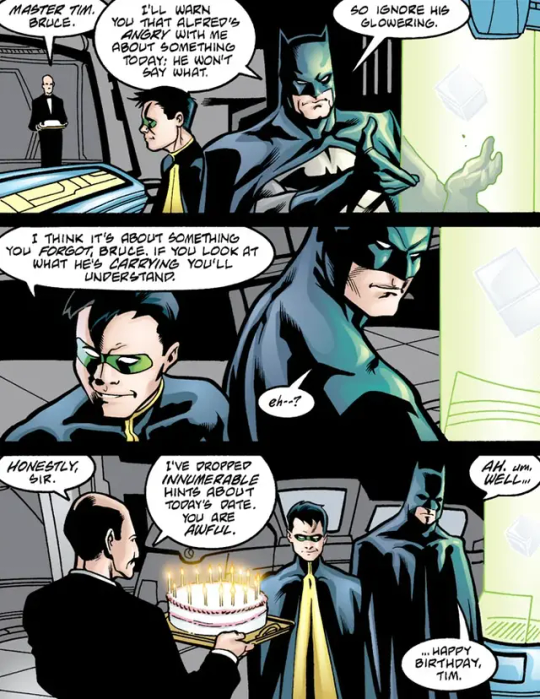

(Robin 1993 116) (They're examining the box with the message that was delivered for his birthday party earlier in the day...so...they both know what today is and what Bruce is helping Tim examine in the machine...and boy...that adds some layers to Alfred's reaction here)



(Robin 1993 120)
Anyway. I'm casting "go to fucking therapy and stop taking your trauma out on the kids around you" on Bruce. It's not very effective.

(Teen Titans 2003 29)
(Recolor of the Titans Tower Fight between Jason and Tim here, in my heart it is the way things ought to have been. Just as in my Jersey heart, I know Tim called Bruce a Motherfucker in Robin 120).
#dc comics#detective comics comics#batman#tim drake#bruce wayne#robin#Jason Todd#Don't mind me#just liking to see Jason's death haunting the narrative#I don’t know if I wanna say this is just the writers not understanding Batman#because he fucking could do it#but the plot he picked for Tim to debunk was weird#If it was supposed to be completely unbelievable#Tim's best friend Bart is known to be from the 31st century#Time travel isn't that impossible for them#also#hell of a thing to do to Tim Drake#who will go on to a point of time ten years in the future and fight himself as a murderer#Do you think that he thought of this exercise at all#when facing Gun Batman?#Since Gun Batman was 10 years into the future#and the warning was supposedly from 9 or 10 years from the future#anyway#I've connected the dots!#“You didn't connect shit!”#I've connected them!
60 notes
·
View notes
Text
i believe that bootstrap paradoxes / stable time loops are inherently religious. if something exists as an effect without cause, if something has been there because it has always been there, if any surrounding events would shift around it to accomodate its always-being-there, if something sprung into existence out of the void because it always had to have sprung into existence, if something exists for no reason and with no apparent explanation once you begin to unravel the chain of events that supposedly lead to its arrival, then that something can be understood as none other than the work of God. God the writer; God that inserts a self-balancing perpetual motion engine into the narrative to resolve a plot hole. a bridge strung over the chasm of impossibility. it came to be because God-the-author decreed it so. because without it the story would grind to a halt, and that's the sound of the universe collapsing
nobody tell the doctor. they'd never get over it.
#spreading my This Science Fiction Show Is Spiritual Actually agenda far and wide#s1 bad wolf arc is a shining example of this methinks. Rose jumpstarted that paradox because for a few minutes *she* became God#see also: clara in listen#bootstrap paradox#time fuckery#time travel#doctor who meta#doctor who#dw#jamie catches up#jamie.txt#time loop#rose tyler#bad wolf#clara oswald#eleventh doctor#twelfth doctor#ninth doctor#the narrative#timefuckery
388 notes
·
View notes
Text
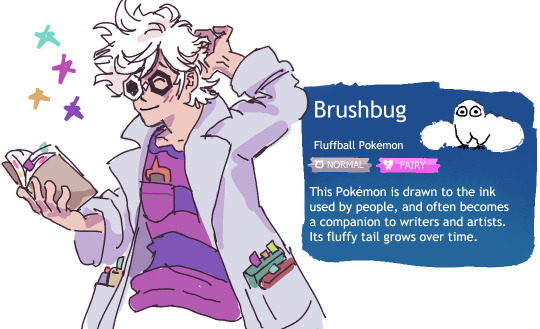
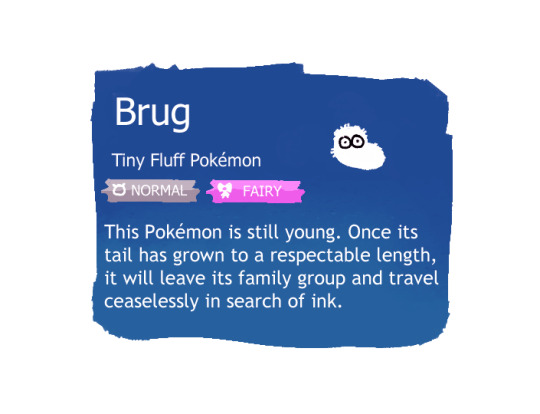
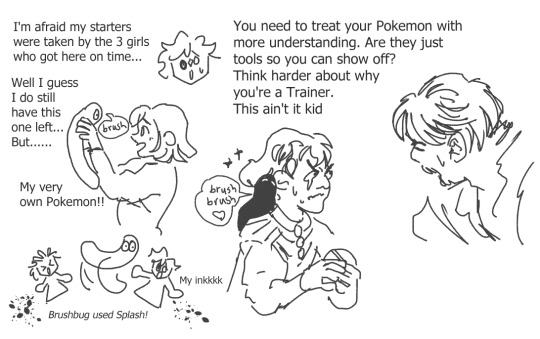
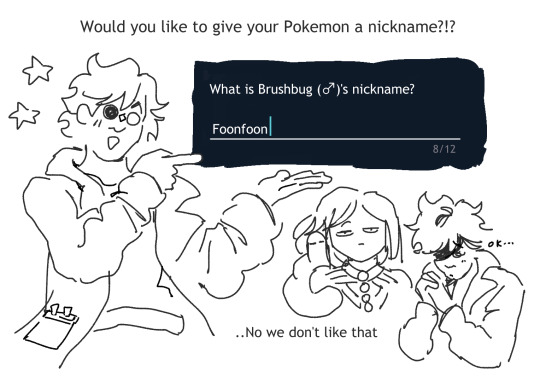
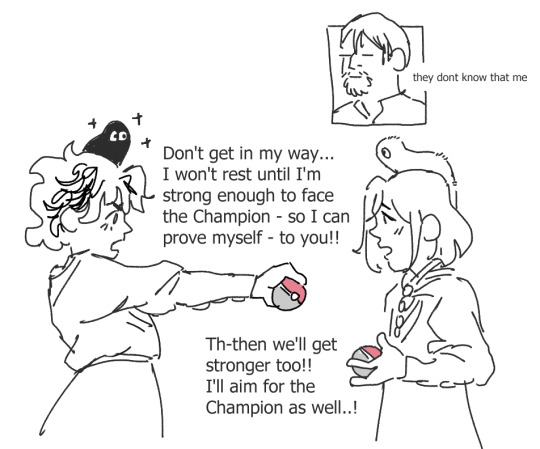
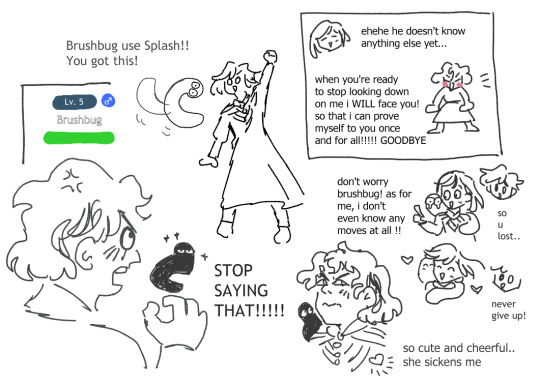
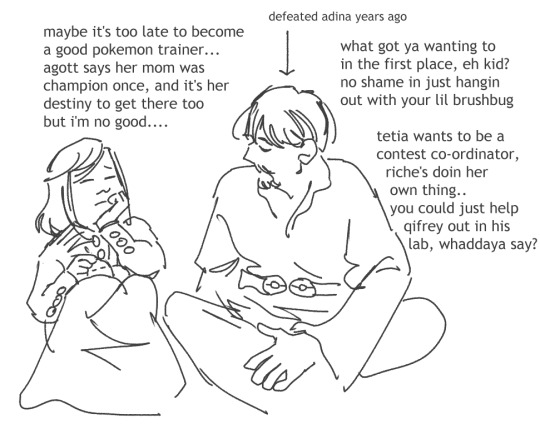
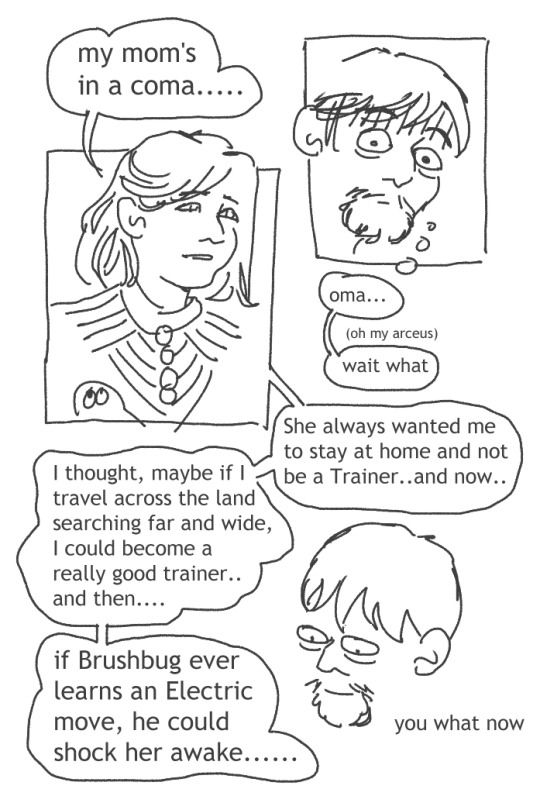
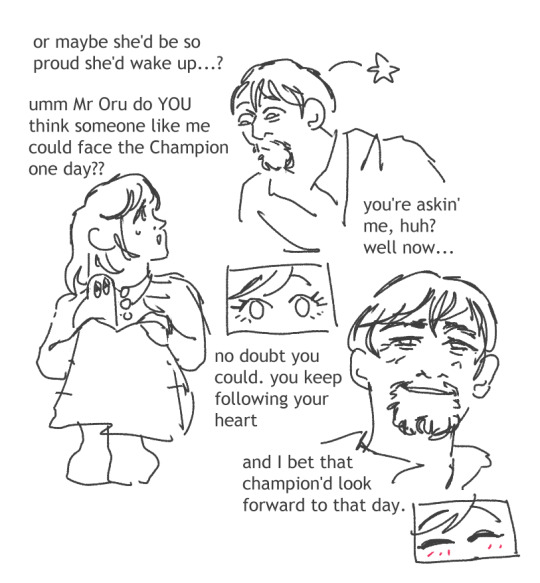
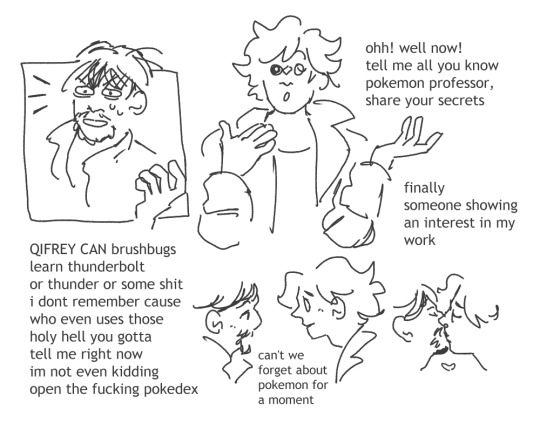
shirahama-sensei reminded me she has a thing for the teacher from pokemon s/v so i randomly went off on an au where qifrey is the professor. etc
#witch hat tag#orufrey#the first image is qifrey dressed as that guy. i'm glad she has an inexplicable attachment to some dorky pokemon man like i do#someone was like 'wouldn't it make more sense for deanreldea to be the champion' .... well no. not in my world .#it maps onto magic skill. champions aren't like the Rulers of the land they're just the most skilled at this thing#oru as a burnt out champion who's gently encouraging a kid like coco to reach him one day means a lot to me. i like pokemon narratives#agott went shiny hunting for the same thing coco had but cooler - just to impress her. she really is a pokemon rival type girl#pushing myself to the limit to prove my worth to you - to get to the summit first so i'm waiting for you..#and then realising it wasn't just to be strong - i realised i started wanting to see your smile. i wanted you to have fun.#i think coco would defeat agott at the end of victory road and then defeat oru & i'll probably draw one last thing abt that at least..#the image is very cinematic..the dialogue and music in my mind..I WANT TO FACE ORU!!!!!!!!!!#the super cool insanely powerful awesome champion is the spouse of my professor and he gave me advice at the beginning...no way....#btw the elite four would be the sages which is perfect (and maybe easthies as the first guy?) evil Team Brimhats#coustas as their renegade gladion-type figure. the gym leaders would be like sun/moon and s/v combined#travelling around facing the best students from different classes - so jujy and eunie etc.#i've barely thought about 'teams' or anything bc i care amore about the narrative side of things always lol#but idk. tetia with a swirlix - eunie would be ghost type boy - riche with small things but also a ceruledge or a steelix something massiv#and brushbug would have a final form which is really long like an eastern dragon- fluffy and with wings like a fairy. It's beautiful to me#well anyway *tries to move on to the rest of life now the brief obsession has passed*#obviously oru would be fire-type tho and qifrey would be water-type and they set off together and traded their starters etc.....it goes on
171 notes
·
View notes